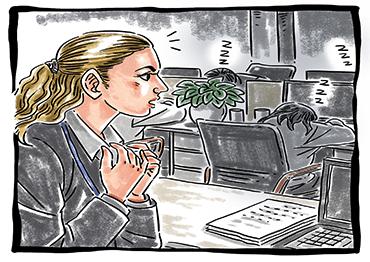n the realm of modern workplaces, a remarkable disparity exists between China and the US when it comes to the prevalence of napping in the office and the legality and facilities associated with it.
Growing up in the US, I had it drilled into my head that if you fall asleep at work, you’re going to get fired! You saw it in TV shows, heard about it in schools, were told about it by your parents, and when you finally started your first internship, got lectured about it by your HR. I never questioned it. Why would I? It made perfect sense. That is until I got my first job in China and every day after a quick lunch I’d come back to find the lights in our shared office turned off and my colleagues napping at their desks. This sight confused me for the longest time until one day our office manager told me to take my work call outside so the office could be quiet after I came back from lunch early to catch up on work.
While I was under the impression that I was there to work and that my every moment there should be dedicated to my job, she was stern about maintaining the peace during the afternoon quiet time so that everyone could be well rested for the rest of the day.
No one was even trying to hide the fact that they were sleeping at work. The office was silent and the snoozing continued. An hour or so later, the lights could come back on and work resumed to normal until it was time to go home.
In China, office napping is relatively common.
The long working hours and intense work pressure often sees employees seeking moments of rest during the day. Napping is seen as a practical way to recharge and boost productivity for the latter part of the workday. It’s not just a personal choice but also an accepted practice in many work environments. In traditional Chinese culture, there is an emphasis on maintaining a balance between work and rest. A short nap during the day can help restore energy and improve productivity in the afternoon. Some companies even encourage it as a means of caring for their employees’ well-being.
There are professions and companies in China that strictly prohibit napping in the workplace and they’ll even state it in the employee’s handbook when you first join. In some, like my second job in the hospitality industry, it’s listed in the handbook as an offense that the HR can fire you on the spot for.
To facilitate napping, many offices in China are equipped with specific furniture designed for this purpose. There are foldable beds that pull out from under your desk and pillows that are designed to help you nap sitting upright more comfortably. These furnishings are a testament to the recognition of the importance of rest. Employees can take a break and unwind, ensuring they return to work refreshed and ready to tackle tasks with renewed energy.
Now I can hear the skepticism already. No, not every white-collar office will have nap time. Some professions are definitely out of the question when it comes to naps, but for those working 996 (12-hour days, 6 days a week), often in tech firms, the long working hours and high intensity can lead to fatigue. A short nap can provide a quick recharge, allowing employees to better cope with the remaining work tasks. And it’s generally understood by HR that a quick nap recharges their employees better than a cup of coffee ever could. Honestly, after years working in China at places where post-lunch naps are acceptable, I wish more workplaces in the US would catch on to this.
In contrast, in the US, office napping is far less common. The work culture in the US emphasizes constant productivity and activity. There is a perception that napping during work hours is unprofessional and may be frowned upon. Instead of normalizing grown-ups napping at work, in the US we give the office unlimited free coffee to keep people going all day long. So you decide. What’s better, a quick mid-day nap and be recharged for the rest of the day, or soldier on with the assistance of caffeine and be burnt out by the end of the day?

 Old Version
Old Version